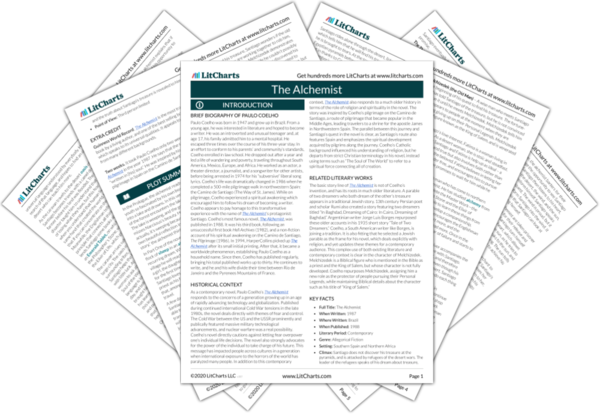Melchizedek (the Old Man) Quotes in The Alchemist
“It's a book that says the same thing almost all the other books in the world say,” continued the old man. “It describes people’s inability to choose their own destinies. And it ends up saying that everyone believes the world's greatest lie.” “What's the world's greatest lie?” the boy asked, completely surprised. “It’s this: that at a certain point in our lives, we lose control of what’s happening to us, and our lives become controlled by fate. That’s the world’s greatest lie.”
“Everyone, when they are young, knows what their Personal Legend is. At that point in their lives, everything is clear and everything is possible. They are not afraid to dream, and to yearn for everything they would like to see happen to them in their lives. But, as time passes, a mysterious force begins to convince them that it will be impossible for them to realize their Personal Legend.”
“To realize one’s destiny is a person's only real obligation.”
“In order to find the treasure, you will have to follow the omens. God has prepared a path for everyone to follow. You just have to read the omens that he left for you.”
Once again he saw that, in that strange land, he was applying the same lessons he had learned with his sheep. “All things are one,” the old man had said.
He thought of the many roads he had traveled, and of the strange way God had chosen to show him his treasure. If he hadn’t believed in the significance of recurrent dreams, he would not have met the Gypsy woman, the king, the thief, or…“Well, it’s a long list. But the path was written in the omens, and there was no way I could go wrong,” he said to himself.

Melchizedek (the Old Man) Quotes in The Alchemist
“It's a book that says the same thing almost all the other books in the world say,” continued the old man. “It describes people’s inability to choose their own destinies. And it ends up saying that everyone believes the world's greatest lie.” “What's the world's greatest lie?” the boy asked, completely surprised. “It’s this: that at a certain point in our lives, we lose control of what’s happening to us, and our lives become controlled by fate. That’s the world’s greatest lie.”
“Everyone, when they are young, knows what their Personal Legend is. At that point in their lives, everything is clear and everything is possible. They are not afraid to dream, and to yearn for everything they would like to see happen to them in their lives. But, as time passes, a mysterious force begins to convince them that it will be impossible for them to realize their Personal Legend.”
“To realize one’s destiny is a person's only real obligation.”
“In order to find the treasure, you will have to follow the omens. God has prepared a path for everyone to follow. You just have to read the omens that he left for you.”
Once again he saw that, in that strange land, he was applying the same lessons he had learned with his sheep. “All things are one,” the old man had said.
He thought of the many roads he had traveled, and of the strange way God had chosen to show him his treasure. If he hadn’t believed in the significance of recurrent dreams, he would not have met the Gypsy woman, the king, the thief, or…“Well, it’s a long list. But the path was written in the omens, and there was no way I could go wrong,” he said to himself.
















